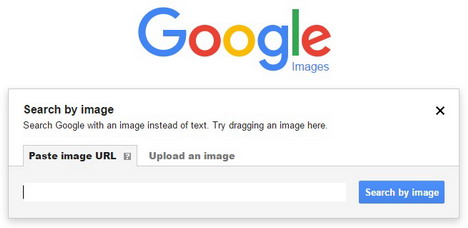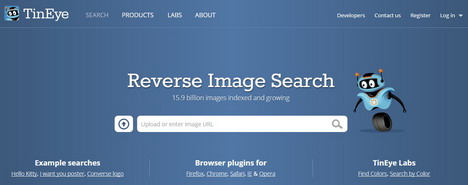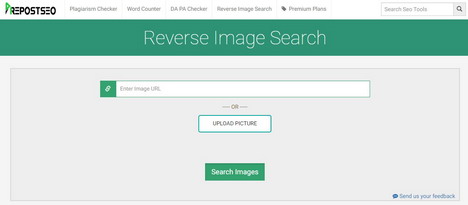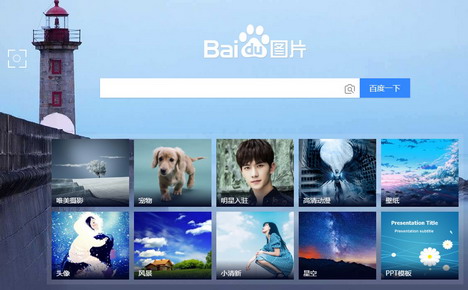Top 20 Best Reverse Image Search Engines (2024)
Sometimes we may find it difficult to search good images on search engines while surfing the internet. This issue just not only wastes much of time of surfers but also demotivates a searcher in finding related information of that image.
To address this problem, there are some good reverse image search engines which quickly make it able to discover desired image and all the related information of a particular image. It all can be done by just uploading a picture or copying URL address of that picture on a reverse image search engine.
Furthermore, it contains keywords which make it quicker to respond. In fact of this, most of the people are unaware of this creative technological change. In order to get people aware of this technological change, we have assembled a list that provides information about top reverse image search engines which are having tremendous performance in accordance with people’s point of view.
Google images are the most admired reverse image search engine among all. People who use the internet, know about Google’s reverse image search engine. It was initiated before 15 years, and now it has become the most powerful image search engine. It works in two possible ways, either in a way to upload a picture on a search engine or copy the link in a searching bar. It also works by dragging an image into a search bar.
2. Lenso.ai
Lenso.ai is an advanced AI-powered reverse image search tool. Thanks to advanced AI technology implemented on lenso.ai, you can easily start searching for places, people, duplicates, related or similar images. Lenso.ai uses complex algorithms in order to match the image uploaded by the user to the pictures that are already in the index.
3. TinEye Reverse Image Search
TinEye is another reverse image search engine powered by idée inc. which is located in Toronto, Canada. This search engine is pretty famous around the globe. It is one of a user-friendly interface because, it supports every image format like GIF, GPEG or PNG but it cannot support large image other than 20MB. It also provides copyright security and ensures the fraudulent use of pictures. It provides expansion to other popular search engines like Firefox, Safari and Google Chrome to provide additional services. tinEye offers a free trial up to 150 extra searches in a week by paying an additional cost of $200 per year.
4. Bing images
Bing reverse image search engine has owned by Microsoft Company it permits users to copy a picture from PC and paste it in the search bar or insert image’s hyperlink in a search bar after that user become able to get reliable search outcomes. In recent days, Bing has also introduced this tool in IOS to get access to desired images. Although this application is accessible only in some countries which are the biggest limitation of this search engine.
Yandex is a Russia based reverse image search engine which is the most famous search engine among Russians. This search engine works same like other reverse image search engines. This application is well known for detecting similar images. Searchers can have the access of this search engine without even getting log in into it. This is totally free for internet surfers and has an ability to sort out images according to the desired size and format.
6. Prepostseo
It’s the best tool when you have to perform a comprehensive image search. It’s very easy to get the desired image through this tool. It has two different methods to search for photos from the internet. You can directly paste online image URL or you can upload pictures.
7. Pinterest
Pinterest is the finest reverse image search engine which supports advanced technology because it keeps updating its search engine. It was initiated in November 2015; it can identify same images which are its competitive advantage. The most interesting thing about it is to find related details about a specific part of the whole image, and you can also drag or zoom the image on a search engine without even downloading it.
8. Baidu
Baidu is china’s leading reverse image search engine which mainly consists on the Chinese language, but users have a right to change its language into their comfortable language. Although people find it challenging because they are not familiar with Chinese language and users, have to keep altering the language whenever they open it.
9. Yahoo images
Yahoo Images is a robust image search engine that leverages the power of Yahoo’s extensive web index to provide users with a vast array of images from across the internet. It offers a simple and intuitive interface where users can enter keywords or upload images to find visually similar results. Yahoo Images integrates advanced algorithms to deliver relevant results quickly, making it an excellent tool for both personal and professional use. Whether you’re looking for high-quality images for a project, searching for a source of a photo, or wanting to find similar visuals, Yahoo Images provides a reliable and comprehensive search experience. The platform also includes various filtering options, such as size, color, and usage rights, allowing users to fine-tune their search results according to their specific needs.
10. Berify
Berify is a dedicated reverse image search engine designed to help users track down their photos and videos across the internet. This tool is particularly useful for photographers, models, and businesses that need to monitor the use of their visual content. Berify combines its own proprietary image matching technology with data from major search engines, providing a thorough and detailed search process. Users can upload images to Berify’s platform, which then scans billions of images on websites and social media platforms to find matches. Berify also offers a unique feature that sends notifications whenever your images are found online, helping you stay informed about the usage of your content. Its detailed reports and user-friendly interface make it easy to manage and protect your images, ensuring that you can take action against unauthorized use swiftly and effectively.
11. Flickr
Flickr is a well-known image hosting service that also offers a reverse image search capability. This feature allows users to search for images based on an uploaded photo, providing results from Flickr’s extensive database of user-uploaded images. Flickr’s reverse image search is particularly useful for finding similar photos, identifying the source of an image, or discovering new and relevant content. The platform’s large and diverse community of photographers ensures a rich variety of images, making it a valuable resource for creative professionals and hobbyists alike. Flickr also offers various tools and features to enhance your search experience, including advanced filters and the ability to explore images by tags, groups, and categories. With its user-friendly interface and vast image library, Flickr stands out as a versatile and reliable tool for reverse image searching.
12. Getty Images
Getty Images is a premier stock photo agency that also provides a robust reverse image search feature. This tool is designed to help users find high-quality, royalty-free images that match or are similar to a reference photo. By leveraging Getty’s extensive collection of professional images, users can easily discover visuals that fit their specific needs. The reverse image search on Getty Images is particularly useful for designers, marketers, and media professionals who require high-resolution, licensed images for their projects. The platform’s advanced search algorithms ensure accurate and relevant results, while its intuitive interface makes the process straightforward and efficient. Additionally, Getty Images offers detailed information about each image, including licensing options and usage rights, ensuring that users can make informed decisions about the images they choose to use.
13. IQDB
It is another reverse image search engine which provides detailed knowledge about desired images. Although, it has some limitations like your image size should not exceed from 8MB, but it is not a big deal as a majority of images are ranged between 2-4 MB. Although this is one of the user-friendly search engines with high pace and accurateness.
14. Openverse
Openverse is an open-source search engine for openly licensed media, including images, audio, and other creative works. Initially launched as part of the WordPress project, Openverse aims to make it easy for users to find and use media that is freely available under Creative Commons licenses and other public domain tools. The platform indexes millions of files from a variety of sources, ensuring that users have access to a diverse array of content. Openverse supports advanced search filters, allowing users to narrow down results based on criteria like license type, file type, and more. It also integrates seamlessly with WordPress, making it a valuable tool for bloggers, web developers, and digital content creators who need to source legal, high-quality media for their projects.
15. Google Lens
Google Lens is a powerful image recognition technology developed by Google. Available as a standalone app and integrated into Google Photos and Google Assistant, Google Lens uses machine learning to identify objects, landmarks, text, and other elements within images. It enables users to perform a reverse image search by capturing a photo or uploading an existing image, providing relevant information, similar images, and related content from the web. Google Lens can translate text, identify plants and animals, find product information, and much more. Its versatility and integration with other Google services make it a go-to tool for anyone needing detailed information derived from visual inputs.
Bing Visual Search is a feature within Microsoft’s Bing search engine that allows users to search the web using images instead of text. By uploading a photo or using an image URL, Bing Visual Search identifies objects, places, and text within the image and returns relevant search results, including similar images, webpages, and shopping links. It also provides insights and context about the content of the image. Bing Visual Search is particularly useful for identifying products, exploring landmarks, and discovering more about various subjects. Its user-friendly interface and integration with Bing’s extensive search capabilities make it a valuable tool for visual discovery and research.
17. Photo Sherlock – Search by Photo
Photo Sherlock is a mobile app designed for reverse image searching. Available on both iOS and Android platforms, Photo Sherlock allows users to search by uploading an image or taking a new photo. The app then scans the web for visually similar images and related information. It’s particularly useful for identifying people, objects, and places in photos. Photo Sherlock provides quick access to search results from popular search engines like Google and Yandex, making it a convenient tool for verifying the authenticity of images, finding higher resolution versions, and discovering the origins of photos. Its simplicity and effectiveness have made it a popular choice for mobile users needing a reliable reverse image search solution.
18. Shutterstock
Shutterstock is a leading provider of high-quality licensed images, videos, and music. Its reverse image search tool allows users to find stock images that are similar to an uploaded photo. By using advanced image recognition technology, Shutterstock matches the uploaded image with its vast library of millions of professional photos, illustrations, and vectors. This tool is particularly valuable for designers, marketers, and content creators looking to find specific styles, themes, or compositions in stock imagery. The Shutterstock reverse image search enhances the creative process by offering an efficient way to discover the perfect image for any project, ensuring both quality and relevance.
19. Pixsy
Pixsy is a specialized reverse image search tool designed for photographers and content creators to protect their visual work online. It not only identifies where images appear on the internet but also helps users manage copyright infringements. Pixsy’s platform enables users to upload their images and automatically search for matches across the web. If unauthorized use is detected, Pixsy offers a range of enforcement options, including takedown requests and legal support. With its focus on protecting intellectual property, Pixsy is an essential tool for anyone looking to safeguard their images and ensure they are properly credited and compensated.
20. SmallSEOTools – Reverse Image Search
SmallSEOTools offers a free reverse image search tool that allows users to find similar images across the internet. By uploading an image or entering an image URL, users can quickly discover where else the image appears online. This tool leverages multiple search engines, including Google, Bing, and Yandex, to provide comprehensive results. SmallSEOTools’ reverse image search is particularly useful for identifying plagiarism, sourcing images for content, and verifying the authenticity of photos. Its accessibility and ease of use make it a handy resource for webmasters, content creators, and anyone needing to track the usage of images online.
21. Duplichecker
Duplichecker provides a reverse image search tool that helps users find similar images on the web. Users can upload an image, provide an image URL, or paste an image to initiate the search. Duplichecker then scans the internet using multiple search engines to return matching images and related information. This tool is particularly beneficial for detecting image plagiarism, verifying the originality of photos, and sourcing images for various projects. Duplichecker’s reverse image search is user-friendly and efficient, making it a valuable tool for anyone needing to track image usage or find visual content online.
22. Image Raider
Infringement Report’s Raider Reverse Image Search is a powerful tool designed to help users find and monitor the usage of their images across the internet. This service is particularly beneficial for photographers, artists, and content creators who want to protect their intellectual property. Raider utilizes advanced image recognition technology to scan millions of websites and social media platforms, providing comprehensive results that include not only direct matches but also visually similar images. This tool is equipped with a user-friendly interface, making it easy to upload images and review search results. Users can receive alerts whenever their images are detected online, allowing them to take swift action against unauthorized usage. Raider Reverse Image Search stands out for its accuracy, speed, and the breadth of its search capabilities, making it a valuable resource for anyone looking to safeguard their visual content.
Reverse image search engine is an excellent move towards making the user-friendly interface that allows users to search every sort of image whatever they want with the provision of additional services according to the brand of reverse image search engine. This service is getting better gradually by including more options and enhancing quality of reverse image search engines.
Tags: image, photography, search engine















































